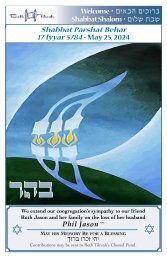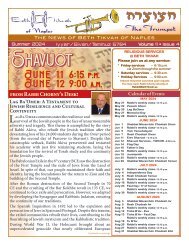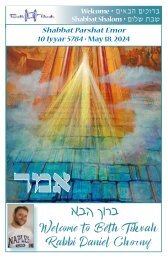You also want an ePaper? Increase the reach of your titles
YUMPU automatically turns print PDFs into web optimized ePapers that Google loves.
Welcome • ohtcv ohfurc<br />
Shabbat Shalom • ouka ,ca<br />
Shabbat Parshat <strong>Nasso</strong><br />
9 Sivan 5784 • June 15, 2024<br />
tab<br />
Sponsor a<br />
Kiddush<br />
Contact Arleen Sivakoff:<br />
dsivakoff@aol.com • 239.455.8811
Yahrtzeiten<br />
June 19<br />
June 20<br />
June 21<br />
Anniversaries<br />
Doris Baum<br />
Paulette Margulies<br />
Sharon Castro<br />
Benjamin Kaye<br />
June 16 Rosalee & Jerry Bogo (61)<br />
June 17 Beverly & Andrew Blazar (68)<br />
Judith & Mayer Levitt (62)<br />
vfrck oburfz<br />
June 14 • 8 Sivan Faye Keyser – Wife of Stephen Keyser<br />
Jerry Ritigstein – Brother-in-law of Shepard Scheinberg<br />
June 16 • 10 Sivan Renee Dorn – Sister of Judy Fant<br />
June 17 • 11 Sivan Dorothy Gordon – Mother of Ben Post<br />
June 18 • 12 Sivan Jacob Rosen – Father-in-law of Norma Rosen<br />
June 20 • 14 Sivan Lillian Stein – Mother of Ralph Stein<br />
Birthdays<br />
jna `skuv ouh<br />
cuy kzn
Torah & Haftarah Readings:<br />
Shabbat NASSO: Numbers 5:11–6:27 (Cycle 2) (Etz Hayim p. 796)<br />
1. 5:11-15 2. 5:16-26 3. 5:27-6:4 4. 6:5-8<br />
5. 6:9-15 6. 6:16-21 7. 6:22-27 M. 7:87-89 (p. 811)<br />
Haftarah: Judges 13:2–25 (p. 813)<br />
Torah Commentary<br />
D’var Torah:<br />
Nachshon the Jumper or Stoner - Bex Stern-Rosenblatt<br />
At the end of our parashah, we jump back in time to watch the heads of<br />
the tribes bring offerings for the dedication of the Mishkan, which we last<br />
read about way back at the beginning of Leviticus. However, here in the<br />
Book of Numbers, we love enumerating people and the listing of these<br />
offerings gives us yet another opportunity to put the Twelve Tribes in<br />
order. This is the fourth time so far in Numbers that the tribes have been<br />
listed. The first two times, the list is organized according to the mother of<br />
each tribe in birth order. But the second two times, Judah jumps rank and<br />
heads the list.<br />
Much has been made of this jump. After all, it is from the Tribe of Judah<br />
that our kings will descend, rather than from the Tribe of Reuben. We see<br />
in the stories of Genesis ample reason to choose Judah and his descendants<br />
rather than his murderous and licentious older brothers. And, after all, we<br />
seem to have a preference for subverting the custom of primogeniture.<br />
The listing in our parashah is a listing of the head of each tribe. The tribe<br />
of Judah is represented by Nahshon ben Aminadav. In our parashah, and<br />
in the Tanakh, Nahshon is a minor character. We know almost nothing<br />
about him. His biggest moments are his inclusion in various lists and his<br />
being distantly related to more well-known characters. Jewish tradition,<br />
however, turns him into a macher. Needing to explain why he jumps the<br />
line, changing the order of the listing of the tribes, midrashim ascribe to<br />
him the qualities that they would most want in a leader.<br />
He is the main character of one of the most famous midrashim. It is the<br />
story of Israel, caught between the Reed Sea and the pursuing Egyptians,<br />
until one brave Israelite walks into the sea and it begins to part. That’s the<br />
story we read in Bamidbar Rabbah, and it’s lovely. We value Nahshon<br />
for taking the initiative, for having faith, for coming from a good family<br />
that brought him up well. We disparage the rest of Israel for lacking these<br />
qualities.<br />
As the story is first told, however, in the Mekhilta and then in Tractate
Sotah, two options are given. The second is the story similar to the one we<br />
read in Bamidbar Rabbah. All the other tribes stood around declaring in<br />
fear that they would not be first to enter the sea. Nahshon jumped right in.<br />
From this act, his tribe, Judah, merited to rule.<br />
However, the first option, expounded by Rabbi Meir, presents very<br />
different values for leadership. In this version, all the tribes are competing<br />
for the honor of being the first tribe to enter the sea. The first to jump<br />
in was Benjamin. For this, Benjamin received the honor of having the<br />
Temple built upon its tribal land. The leaders of Judah, however, did not<br />
let this go easily. Benjamin subverted the correct order. So while the Tribe<br />
of Benjamin was entering the water, the heads of Judah threw stones at<br />
them. For this action, Judah too is rewarded. Judah receives the kingship, a<br />
pun on the word for stoning. In this option, we uphold law and order. We<br />
uphold zealotry and devotion.<br />
This version sees all the Israelites as capable and willing, rather than just<br />
one man out of a whole new nation. This version also sees Israelite tribes<br />
willing to turn to infighting even as they are caught between the sea and<br />
the Egyptian army. This version even rewards that infighting. When we<br />
reflect back on the stories we tell now of Nahshon, what do we value?<br />
What does it take to be a hero today? What might it mean for the hero’s<br />
reward to be the chance to give first?<br />
✺ Join Rabbi Chorny<br />
for his weekly discussion<br />
group, Tuesdays at<br />
12:15 p.m. via<br />
and IN Person<br />
Beth Tikvah of Naples<br />
1459 Pine Ridge Road<br />
Naples, FL 34109<br />
239 434-1818<br />
Visit us online at<br />
bethtikvahnaples.org<br />
or scan the QR code

















